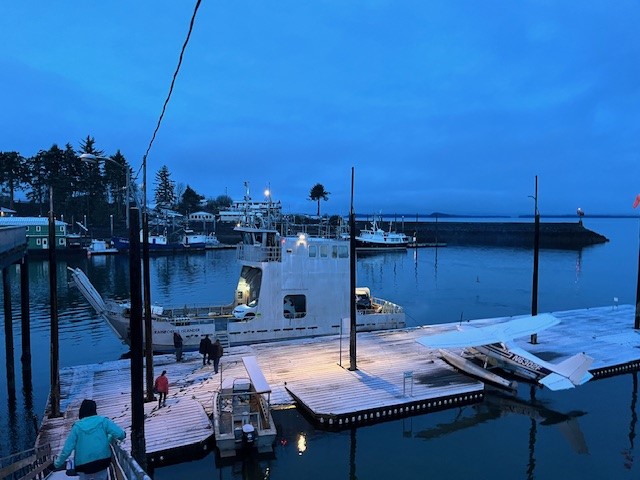
People living in Southeast Alaska depend on boats and planes to reach other communities. The region’s network of islands has no connecting roads. To see how important water transportation is for Wrangellites, KSTK’s Colette Czarnecki hopped on Wrangell’s local water taxi, the Rainforest Islander.
By all accounts, taking a ferry or boat ride is cheaper than a plane ticket.
On an early Saturday morning, the Rainforest Islander’s Captain Eric Yancey, is ready for a long day of transporting groups of people back and forth to Mitkof Island where the town of Petersburg is.
“When we get done today with Wrangell stuff, myself and the deckhand are headed out to Coffman Cove to spend the night there because early Sunday morning we are picking up the Wrangell high school basketball boys and girls teams,” he said. “We’re bringing them back to Wrangell and back to back trips bringing the peewee wrestlers home back to Wrangell.”
This weekend is mostly sports teams, the AAU girls basketball and the peewee wrestlers. In total he’s transporting close to 150 people. But there’s a few other passengers on the ferry, including a couple of cars that want to get to Petersburg on Mitkof Island.
He’s making three trips to accommodate everyone who needs the ride, and then heading to Coffman Cove later this evening. He also assists the fuel barge when it brings fuel into Wrangell.
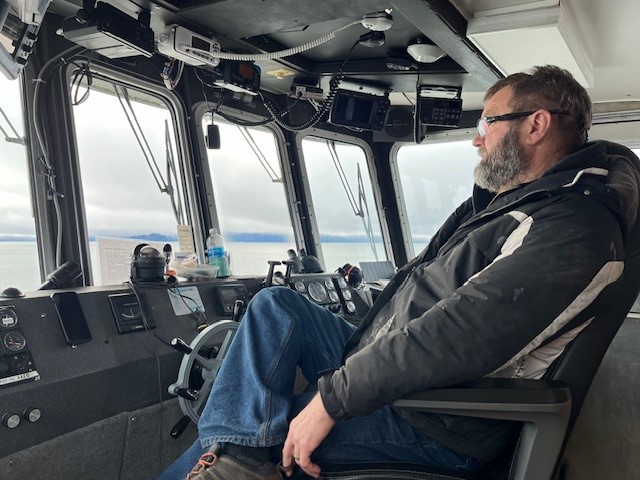
“Usually it’s just a phone call from somebody going, ‘Hey, what do you got going on? Can we do it on this day or that day in these times?’ Just negotiate that all out, depending on what’s going on,” he said. “Everybody’s generally pretty great at adjusting a little bit if need be and so yeah, it works pretty well.”
Yancey said that he transports people in almost all weather. In the winter time, it’s mostly for sports. Summer brings on outdoor enthusiasts. He also transports people to regional events like the Little Norway Festival in Petersburg.
“Even though it’s a short little run, it can get really rough out here,” he said. “So there could definitely potentially be like, ‘Yeah, I don’t think we’re gonna do that today.’ It be kind of rare in this boat, but still, I can see it happening.”
Yancey said some passengers, especially the kids, get excited when the weather is bad.
“It’s been really fun working with the school systems and the kids,” he said. “Especially when you get the younger ones who are kind of all excited, you know? And even like, what on some of the trips were even rough, they’re loving it and (they) go, ‘go faster, hit the waves harder.’ It’s kind of really fun, but I go, ‘we’re not going to do that probably, it’s already rough enough.'”
Yancey also likes to do fun little side trips to expose his passengers to wildlife, such as porpoises, dolphins and sea lions.
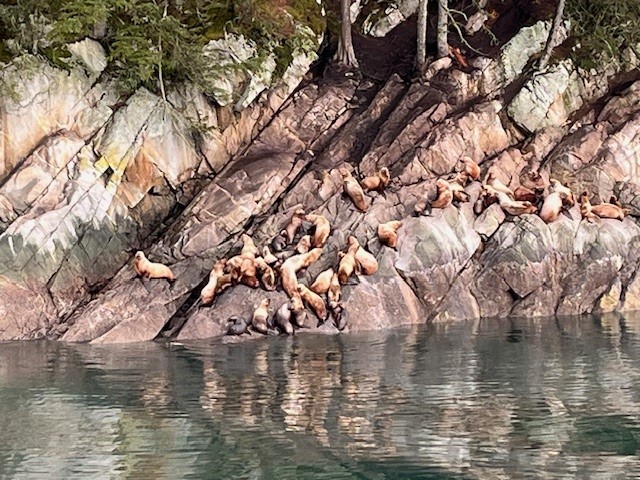
On this trip back to Wrangell, we swing by a nearby island to visit some Steller Sea Lions on the island rock.
He said his operation makes it convenient for transporting kids for sports games when the communities are close together. It’s a way of life here in Southeast Alaska.
“Because of the dynamics of Southeast Alaska, it’s just not necessarily like jumping in your car, drive 40 or 50 miles to go home,” he said. “There’s a lot more to it, but we all get it. Most everybody has lived here for so long. It’s part of the life style that you’d have.”
Penny Allen is on board today. She’s the Amateur Athletic Union Girls Basketball team’s coach. She said they utilize all water transportation services to get the girls to the games.
“We take whatever charter boat we can,” she said. “We try to spread the wealth. We can get everybody in one boat on this one. So it worked out for us.”
One of the basketball players, eighth grader Selah Purviance, said the team rode on the ferry last year for middle school basketball.
“Whenever we have games, whenever we’re close by like in Craig or like Petersburg, we use the boats,” she said. “But not when we go to Juneau or Sitka. We usually use a plane when we go there.”
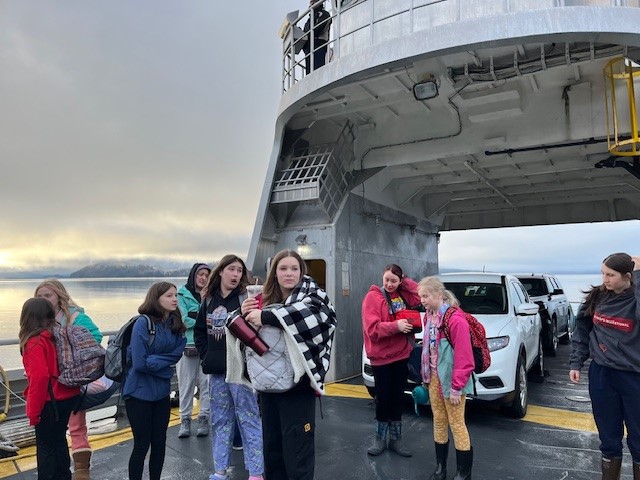
Purviance’s teammate, AJ Roundtree, said last year they took a plane to compete in Juneau and then ferried back.
“It’s really fun, especially when you have to wake up at 3am to get off the ferry,” Roundtree said.
During the second trip of the day, the Rainforest Islander shipped the Wrangell Wolfpack, also known as the peewee wrestlers, to Mitkof Island. Coach Jeff Davidson says since he was in sports as a kid, transporting by boat was always a way of life.
“I spent hours, even days on the ferry traveling back and forth for wrestling, basketball, so on and so forth,” he said. “We would be gone for three or four days, get back on Sunday, have school for one or two days, and then turn right back around, get on the boat and take off. I have some of my fondest memories because I’m traveling with my buddies, I’m hanging out. And it’s mostly chaos, but it’s also a controlled chaos.”
Student teams traveling by ferry rarely happen anymore because the ferry system has dramatically cut back its schedule. The state’s ferry fleet is old and needs constant repairs. The system has also suffered from short staffing.
But smaller boats have helped fill some of the gaps on shorter trips. Davidson’s wife, Bree, said that water transport has another type of meaning to her.
“Our first year dating, I was fishing out of Petersburg and he was here working,” she said. “Eric made our whole first year really getting together possible because of Breakaway Adventures because I was able to get back and forth or Jeffrey likewise.”
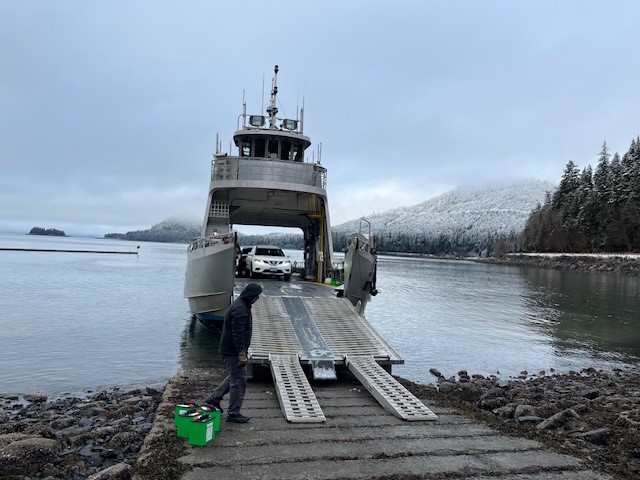
Spenser Stavi, the owner of Breakaway Adventures, bought the company from Yancey in the height of the pandemic. He too transports people, but they’re limited to jet boats, so he can’t transport a vehicle. But that doesn’t stop the company from transporting other things that could be potentially difficult to haul.
“I moved a horse on there from Wrangell to Banana Point on the motivator,” Stavi said. “So yeah, that was kind of probably the most memorable one. Kind of funny. I was a little worried that the horse might get a little squirrely, but yeah, he just stood there, took the ride and got off, walked right off and into a trailer and went to town in Petersburg.
The caretaker was not with Stavi or the horse on the boat. Stavi said he also moved goats to Petersburg.
Besides that, the company moves people for similar reasons – sports, fishing and tourism. And many other types of reasons.
“Families that have, you know, split parents basically,” he said. “Kids go over there for the weekend, and they’re coming back, a lot of things like that.”
Stavi said they also transport healthcare workers who serve the island communities. He said he likes to think of transporting people more as a service than making money off of the community members.












